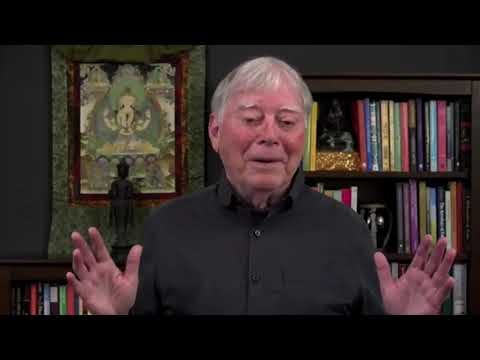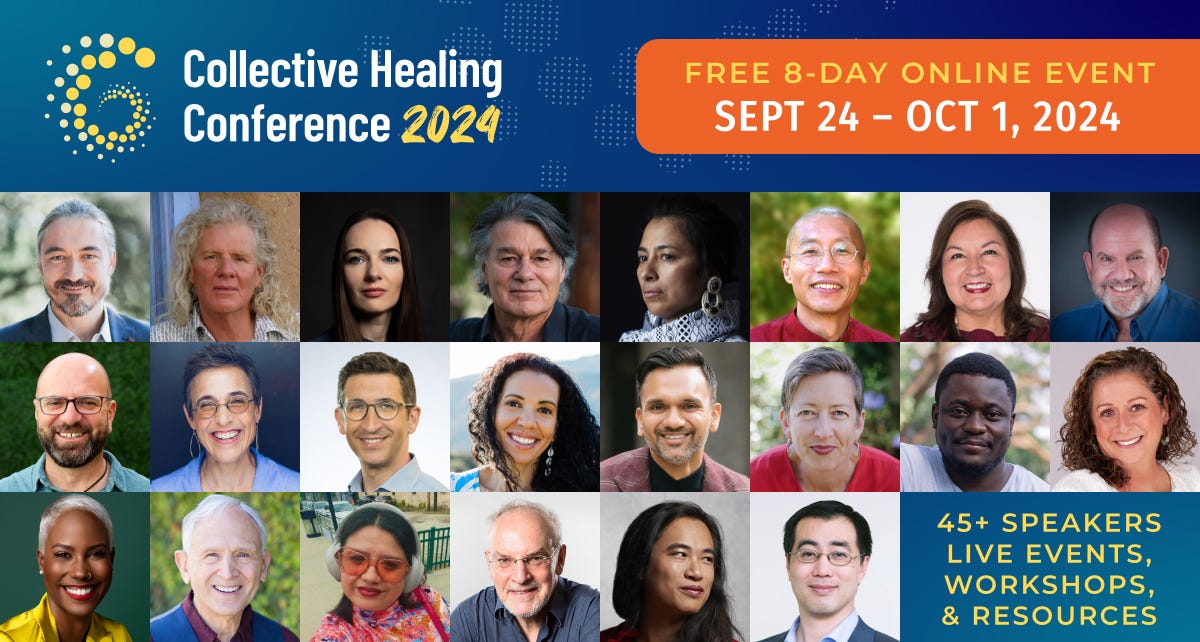If you liked reading this, feel free to click the ❤️ button on this post so more people can discover it on Substack 🙏
A clip from an interview with Michael Meade due to go online on Tuesday, October 1 as part of the eight-day Collective Healing Conference 2024.
I write Toxic Workplace Survival Guy because I want to help as many people as possible do as I did: survive long enough to emerge with my soul, dignity and career intact, on my own terms. A big thank-you to all those who’ve become paid subscribers — you make this work possible.
“The most common form of despair is not being who you are.” — Søren Kierkegaard, as quoted by Michael Meade.
Survival Tool #31: Honour Your Calling
Listening to this talk by Michael Meade on Finding a Calling in Life over the weekend, I felt a deep “yes” reverberating through every cell.
Based on his decades of study of world mythology, and his own life experience, Meade argues that each of us is born with a unique form of “genius” embedded deep within, which Life then calls us to learn to share with the world.
“What calls to us speaks to the personal myth that’s already seeded inside us,” Meade said in his talk. “There’s an inner story that’s trying to unfold through the course of our life, and a key component of that unfolding is hearing and responding to the call. Because in responding to the call, we align ourselves with the paths that are most meaningful to us, but can be most beneficial to other people as well.”
We can of course dismiss Meade’s argument, wary of the idea of mysterious forces guiding our destiny, or sceptical that we could be anything more than the product of our parents, and the environment and culture we grew up in.
But listening to Meade, I heard the ring of truth. I know people who have very clearly embodied the unfoldment that Meade speaks about. And I feel that my own journey seems to feel much livelier, and expand more reliably, in those moments when I feel I’m answering some kind of “call” — however faintly discerned.
So let’s assume that Meade is right.
What if each of us really does receive a “call” seeking to awaken our inner genius? And what does that have to do with being stuck (for now) in our toxic workplace?
Hopeful Possibilities
I think the answers have several layers, and can be very helpful — if we’re willing to have the humility to fully embrace the implications of what Meade is saying.
At one level, it would be tempting to conclude that being stuck (for now) in a toxic workplace is an indicator that we’ve gone off track.
After all, it’s only natural to imagine that following our calling would automatically have a degree of nobility and dignity attached — precisely the qualities lacking in our toxic organisation or team.
More perniciously, we might even think of our toxic workplace ordeal as the natural consequence of our failure to answer our calling — a kind of punishment from the Universe for being too gutless to walk our true path.
The reality may be more nuanced — and more hopeful.
It may be that the misery of the toxic workplace is precisely the wake-up call we needed to begin to take the task of listening for the call — and offering a meaningful response — more seriously.
As Meade observes, comfort breeds complacency. It’s precisely when we’re faced with chaos and dissolution on an individual (and global) level that we become more receptive to what the call is attempting to awaken in us.
“When we’re personally in difficult circumstances, there can be an acceleration of calling,” Meade said. “In a sense, we’re closer to what’s calling to us when we’re in turmoil, when we’re in difficulty, because we loosen up our sense of Self. And we know that we’re missing something, and that makes us more available to the call.”
Instead of resisting our toxic workplace ordeal by telling ourselves “this shouldn’t be happening,” could we reframe our predicament by seeing it as an invitation to start to listen more deeply to what is calling us? (Survival Tool #21: Apply a Wider Lens).
Instead of getting dragged into a victim story, can we use our predicament as an invitation to make the time and space to really tune into our Soul’s deepest longing?
By becoming very clear on what aspects of the toxic workplace are so painful to us, we can then become much clearer about the values we want to embody in the future.
This process, as Meade reminds us, isn’t easy.
Hearing the call is difficult enough in our distracted, over-scheduled and demanding contemporary world.
And even if we do hear the signal clearly, what do we do?
Our calling can demand major changes in the way we’re living and working. As Meade argues, though everybody is called, not everyone answers.
“Even though everyone has a calling, it’s easier to walk a predictable path…than find the courage to step onto that pathless path, the path we were called to take,” Meade said. “The calling always takes us off the maps that are made by others.”
Our toxic workplace can help us find that courage, if we take our suffering as a sign that it’s time to reject the compromises we’ve made in the past, and align ourselves with what’s calls us towards our authentic future.
A Twist in the Tale
There is of course a potential twist:
What if we feel like we are following our calling, but that calling has led us into the toxic workplace that we’re now trying to escape?
If that’s our predicament, then we may wish to consider whether navigating our toxic workplace could be an initiatory ordeal that we must undergo if we’re going to answer our calling at a deeper level. (Survival Tool #7: Reframe Your Predicament).
Rather than being a sign that we’re off-track, our toxic workplace ordeal might be an integral part of our path — helping us to step into a greater level of maturity, develop healthier boundaries, and become wise to the ways of the world in a way that will serve the truest fulfilment of our calling in the future.
We could ask ourselves:
Is this particular workplace the only place we can answer our call?
If I do feel that my calling truly does demand my participation (for now) in a toxic workplace, what steps can I take to mitigate the toll it’s taking on me, and the people close to me?
How can I start a process of self-inquiry that could unveil new dimensions of my calling, that don’t involve my current toxic work conditions?
Meade reminds us that matters of calling are rarely simple: It’s not easy to hear the call, or reorganise our lives to answer it when we do.
But his mythic framing offers a new perspective on the everyday tribulations of our toxic workplace that can help us orient ourselves to a larger vision for our lives, that will — sooner or later — deliver us to a working environment we love.
Summary
“Your toxic workplace ordeal is a prompt to explore your relationship to “calling.” Ask yourself if you need to make more time and space to listen for your Soul’s whisper. Or could your toxic workplace be part of an initiatory ordeal that will ultimately allow you to fulfil your calling with more skill, strength and guile?”
Do check out the Collective Healing Conference 2024; the talks will be a fantastic resource for anyone seeking a deeper understanding of how to heal trauma.1
I consult on surviving toxic workplaces; and can also help you navigate your toxic workplace via the Tarot. Click here to inquire:
I write Toxic Workplace Survival Guy during my spare time from working as an editor at nonprofit climate news service DeSmog (a model workplace). Subscribing, sharing, liking, commenting or buying me a coffee helps make this project sustainable. Thank you!
Toxic Workplace Survival Guy receives a portion of any conference package sold through links in this newsletter. I served as a co-host for the past two editions of this gathering (formerly known as the Collective Trauma Summit) and can highly recommend it.




